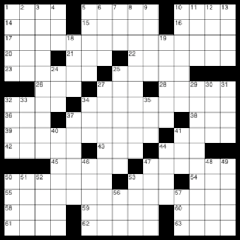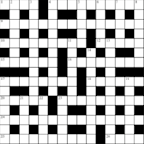Search results
Results From The WOW.Com Content Network
On 18 August 1942, a day before the Dieppe raid, 'Dieppe' appeared as an answer in The Daily Telegraph crossword (set on 17 August 1942) (clued "French port"), causing a security alarm. The War Office suspected that the crossword had been used to pass intelligence to the enemy and called upon Lord Tweedsmuir, then a senior intelligence officer ...
Android. Release. February 15, 1942; 82 years ago. ( 1942-02-15) Genre (s) Word game. Mode (s) Single-player. The New York Times Crossword (marketed as The Crossword) is a daily American-style crossword puzzle published in The New York Times as part of The New York Times Games, online on the newspaper's website, syndicated to more than 300 ...
The Crossword Extra word was not part of the main puzzle (so it was truly an "extra" word) and announced before certain clues in each round. A correct Crossword Extra answer was worth $300 in Round 1 and $600 in Round 2 with no deduction for a wrong answer or no answer at all. There was no Crossword Extra in Round 3. Changes
A code word is a word or a phrase designed to convey a predetermined meaning to an audience who know the phrase, while remaining inconspicuous to the uninitiated. For example, a public address system may be used to make an announcement asking for "Inspector Sands" to attend a particular area, which staff will recognise as a code word for a fire or bomb threat, and the general public will ignore.
Markiplier (real name: Mark Fischbach) hosts “Distractible” with two of his longtime friends: Wade Barnes (whom “I think I’ve known since the sixth grade,” Fischbach says) and Bob ...
The International Radiotelephony Spelling Alphabet or simply Radiotelephony Spelling Alphabet, commonly known as the NATO phonetic alphabet, is the most widely used set of clear-code words for communicating the letters of the Roman alphabet. Technically a radiotelephonic spelling alphabet, it goes by various names, including NATO spelling ...
Duress code. A duress code is a covert distress signal used by an individual who is being coerced by one or more hostile persons. It is used to warn others that they are being forced to do something against their will. Typically, the warning is given via some innocuous signal embedded in normal communication, such as a code-word or phrase ...
Code word (figure of speech), designed to convey a predetermined meaning to a receptive audience, while remaining inconspicuous to others. Procedure word, in voice communication. Code word, an element of a codebook designed so that the meaning of the code word is opaque without the code book. Code name, a clandestine name or cryptonym used to ...
1 tablespoon paprika. 1 tablespoon dried oregano. 1 tablespoon gochugaru flakes. 1 teaspoon MSG (optional, but highly recommended) 1 teaspoon ground black pepper. You can adjust the ingredients ...
Code word (communication) In communication, a code word is an element of a standardized code or protocol. Each code word is assembled in accordance with the specific rules of the code and assigned a unique meaning. Code words are typically used for reasons of reliability, clarity, brevity, or secrecy.








